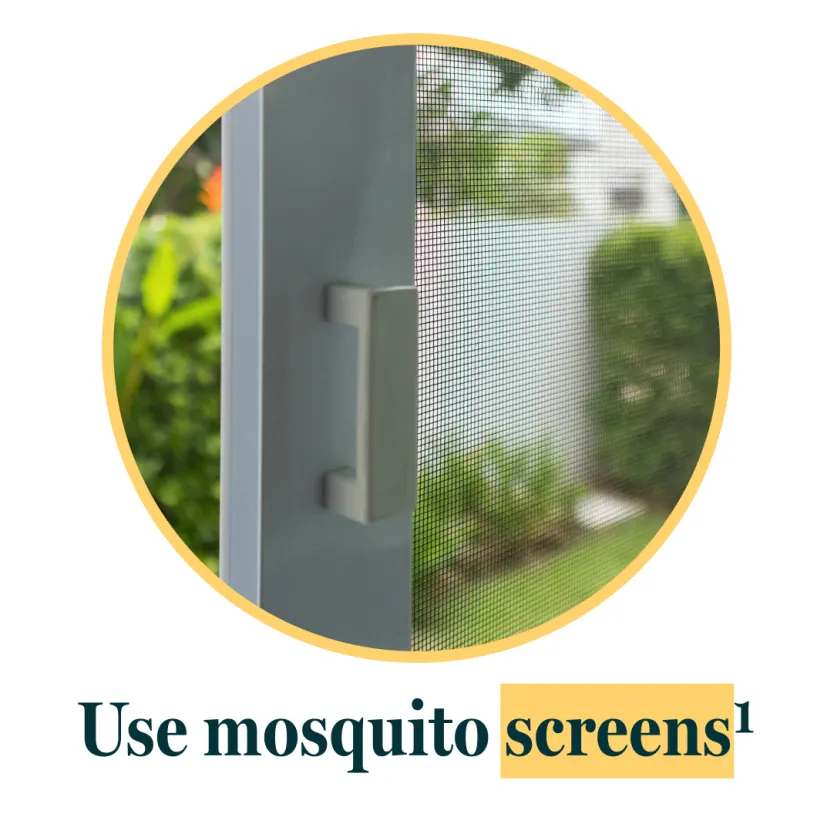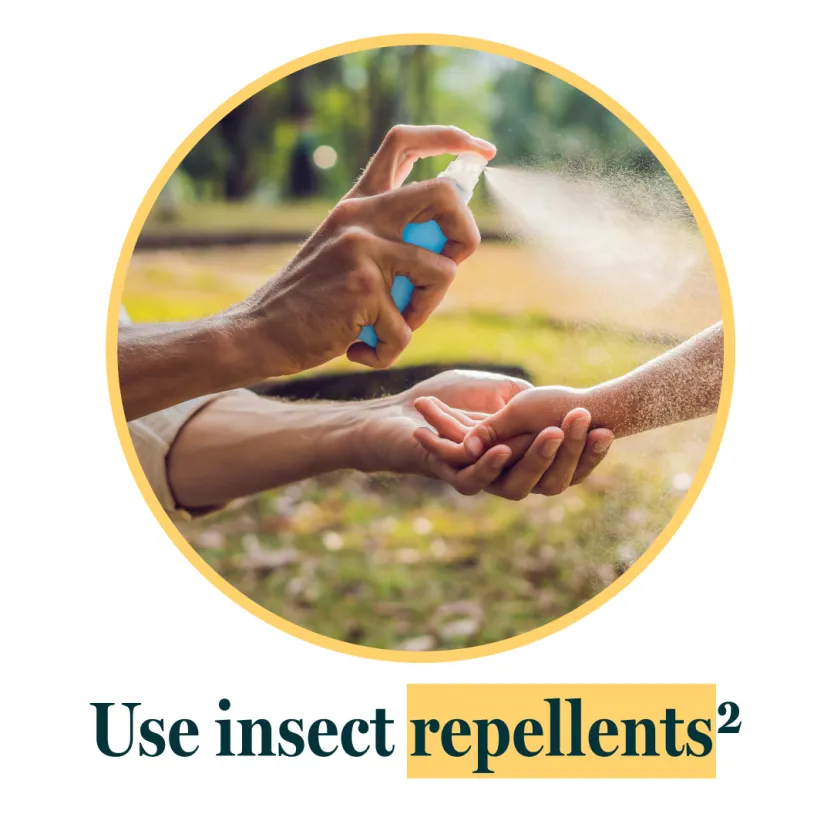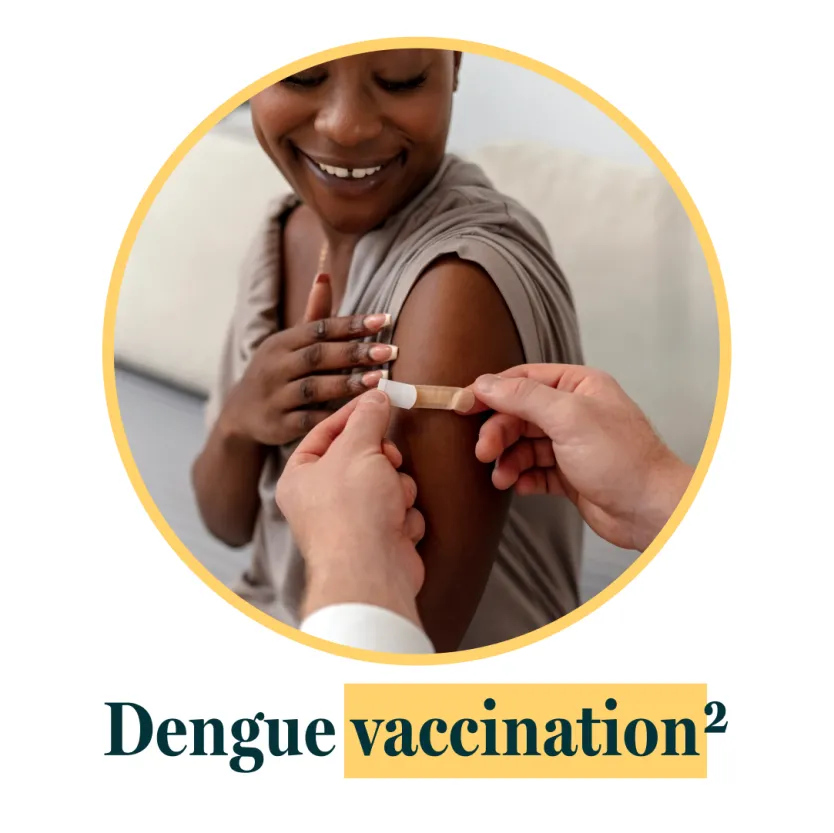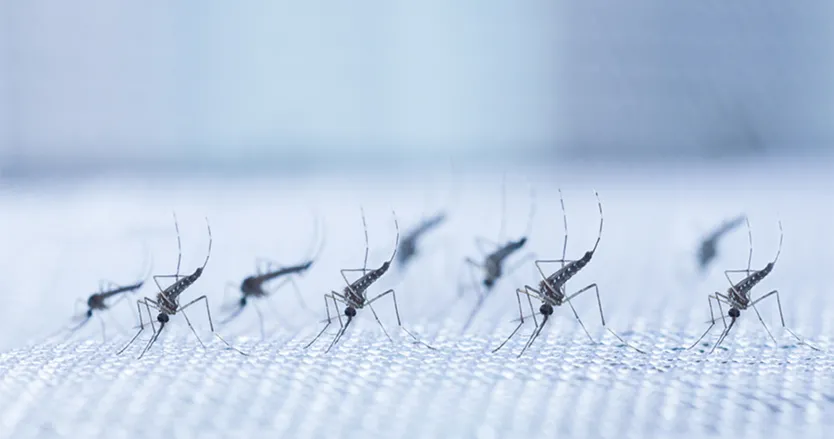Ways to help prevent dengue, that might surprise you
Do you need to protect yourself against dengue?
No specific treatment exists for dengue fever, so preventing it by avoiding mosquito bites and reducing the mosquito population is the best way to protect yourself.1 Remember that everyone living in an area where dengue is common could be at risk, even people who have been infected in the past, whether they showed symptoms or not.1
Know your mosquitoes - understand dengue transmission
Dengue is caused by a virus that is carried by Aedes mosquitoes, which are most active during daylight hours2 and especially at dawn and dusk.1 The virus spreads easily in urban areas with high population density.3 The good news is that you can protect yourself from dengue by avoiding mosquito bites!
Aedes mosquito lays eggs in stagnant water which can survive up to one year4
Make your home a no-fly zone
Be proactive about prevention to help reduce your risk of getting dengue fever.1 You can take the following commonly recommended precautions that some people may be familiar with to help protect yourself and your loved ones and keep these disease-carrying mosquitoes at bay!
Mosquitoes love standing water. Get rid of or cover any containers around your home that collect water, like old tires or flowerpots. If you cannot, make sure you empty and scrub them once a week.5
Make sure your windows and doors have screens.5
Use insect repellents, mosquito coils, and vaporizers, and insecticide-treated materials in your home.3
Use traps for mosquitos, such as ovitraps6 or fishes that eat mosquito larvae.7
Wear loose and protective clothing.5 Mosquitoes can bite through tight clothes. Wear loose long trousers, long-sleeved shirts, and socks.1
Grow plants that can ward off mosquitoes, like citronella grass, lavender, mint, or basil.8
Vaccines are another way to help prevent dengue3, and help protect the person vaccinated from the possible complications of dengue. These vaccines can help prevent you from getting sick if you are exposed to the virus. To learn more about dengue vaccines and see if they are an option for you, reach out to your healthcare provider.
An adult mosquitofish can eat up to 100 mosquito larvae per day10
Protect yourself from dengue mosquitoes when you’re out and about
Use insect repellent containing DEET on your skin and clothes. Wear light-colored clothes that cover as much of your body as possible. Long-sleeved shirts, long pants, socks, and shoes are your best friends in the fight against mosquito bites.1,3,11
Preventing dengue is a team effort
By getting involved in programs in your community that help control mosquitoes, you can make a difference in reducing the chances of getting dengue fever.9
These initiatives are all about lowering the number of mosquitoes around us, which in turn helps improve protection from dengue.9
If you have the chance to join in, go for it! Your help can truly make a difference to boost your community's overall health and safety.3
Governments are actively working to help control dengue fever
Dengue surveillance: coordinated monitoring of dengue cases and reported presence of mosquitoes to predict and detect outbreaks early and identify high-risk areas12
Vector control: reduce the number of mosquitoes that can transmit dengue by getting rid of standing water, spreading insecticides, or spreading mosquitoes infected with the Wolbachia bacteria.12 This helps reduce the dengue virus's ability to multiply inside the mosquitoes and for mosquitoes to reproduce.13
Education: run public awareness campaigns to educate communities12, including kids at school14
Ongoing vigilance
Stay informed about local outbreaks and adapt your prevention strategies accordingly. Stay informed, stay safe!
There is currently no specific treatment for Dengue, so prevention is key.1,5
Learn more about dengue prevention.
References
Dengue fever. Mayo Clinic. Published July 17, 2024. Accessed November 5, 2024. https://www.mayoclinic.org/diseases-conditions/dengue-fever/symptoms-causes/syc-20353078.
Learn More Mosquito Protection. Centers for Disease Control and Prevention. Accessed November 5, 2024. https://www.cdc.gov/dengue/training/cme/ccm/Learn_More_Mosquito_Protection.pdf.
Dengue and severe dengue. World Health Organization. Published April 23, 2024. Accessed November 5, 2024. https://www.who.int/news-room/fact-sheets/detail/dengue-and-severe-dengue.
Rasad A, Sreedharan S, Bakthavachalu B, Laxman S. Eggs of the mosquito Aedes aegypti survive desiccation by rewiring their polyamine and lipid metabolism. PLOS Biol. 2023; 21(10): e3002342. https://doi.org/10.1371/journal.pbio.3002342
Preventing mosquito bites. Centers for Disease Control and Prevention. Published August 28, 2024. Accessed November 5, 2024. https://www.cdc.gov/mosquitoes/prevention/index.html.
Sasmita HI, Neoh KB, Yusmalinar S, Anggraeni T, Chang NT, et al. Ovitrap surveillance of dengue vector mosquitoes in Bandung City, West Java Province, Indonesia. PLoS Negl Trop Dis. 2021; 15(10): e0009896. https://doi.org/10.1371/journal.pntd.0009896
Use of fish for mosquito control. World Health Organization. Published 2003. Accessed November 5, 2024. https://applications.emro.who.int/dsaf/dsa205.pdf.
Yoo C. 12 Mosquito Repellent Plants. GardenDesign.com. Updated January 6, 2022. Accessed November 5, 2024. https://www.gardendesign.com/plants/mosquito-repellent.html.
Rather IA, Parray HA, Lone JB, et al. Prevention and Control Strategies to Counter Dengue Virus Infection. Front Cell Infect Microbiol. 2017;7:336. Published 2017 Jul 25. doi:10.3389/fcimb.2017.00336
Cassiano, E. J., Hill, J. E., Tuckett, Q., & Watson, C. A. Eastern Mosquitofish, Gambusia holbrooki, for Control of Mosquito Larvae. Florida Online Journals. 2018; FA202, 4/2018. EDIS, 2018(2).
Protect yourself and your animals from mosquito and tick bites. Québec Health and Environment. Updated October 25, 2024. Accessed November 5, 2024. https://www.quebec.ca/en/health/advice-and-prevention/health-and-environment/protecting-yourself-from-mosquito-and-tick-bites.
Global Strategy for Dengue Prevention and Control - 2012-2020. World Health Organization. Published August 22, 2012. Accessed November 5, 2024. https://www.who.int/publications/i/item/9789241504034
Utarini A, Indriani C, Ahmad RA, et al. Efficacy of Wolbachia-Infected Mosquito Deployments for the Control of Dengue. N Engl J Med. 2021;384(23):2177-2186. doi:10.1056/NEJMoa2030243
Madeira NG, Macharelli CA, Pedras JF, Delfino MC. Education in primary school as a strategy to control dengue. Rev Soc Bras Med Trop. 2002;35(3):221-226. doi:10.1590/s0037-86822002000300004
About Dengue. Centers for Disease Control and Prevention. Published May 14, 2024. Accessed November 5, 2024. https://www.cdc.gov/dengue/about/index.html.































